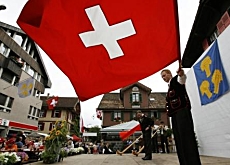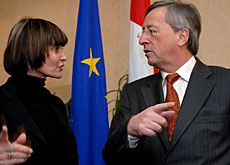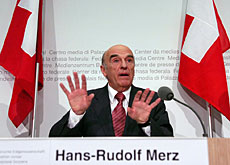EU prepares to fire next salvo in tax war

A new round opens this week in the dispute between Switzerland and the European Union over tax breaks granted to European companies by some Swiss cantons.
The aim of a meeting of EU experts on Tuesday is to reach consensus on a European Commission mandate to put pressure on Switzerland to end the practice.
According to a document seen by the Swiss news agency, the Commission is seeking to negotiate an “accord” with Switzerland forbidding any subsidies that are incompatible with the “exemplary” bilateral agreements between Brussels and Bern.
The wording of the document that the EU diplomats will debate includes a call for Switzerland to alter its fiscal policy so no discrepancy remains between taxes placed on profits generated within Switzerland from those derived outside its borders.
The Commission says that the generous tax breaks given to holding companies amount to illegal state aid and are in violation of bilateral agreements.
Many EU countries are angry that tax revenues are being lost as companies relocate to Switzerland – mainly to small cantons offering low levies.
In the latest high profile case, Kraft Foods announced it would move its European headquarters to Zurich from London and Vienna later this year.
Switzerland and the EU have been embroiled in the corporate tax dispute since 2005 but it came to a head earlier this month when the Commission decided the tax breaks were in breach of a 1972 trade agreement.
Swiss position
The Swiss government was quick to counter that there are no contractual regulations between Switzerland and the EU that require the harmonisation of company taxation.
Finance Minister Hans-Rudolf Merz even went so far as to call the European Commission’s demand for negotiations an attack on Swiss sovereignty.
Cantons are free to set their own tax rates under the Swiss constitution, and they argue that even if Brussels were to increase pressure on Bern, the federal authorities would have no legal right to intervene at the cantonal level.
The Swiss Tax Harmonisation Act, introduced in 2001, obliges cantons to define taxable income and lays down what constitutes allowances and deductions, but it leaves the setting of rates to the cantonal authorities.
There are an estimated 20,000 holding and trading companies listed in Switzerland. They generate tax revenues for the Swiss and cantonal governments of around SFr3 billion ($2.43 billion) a year.
The Swiss point out that the practice of lowering corporate tax rates to attract large company headquarters has also been successfully utilised by Ireland and Cyprus, among others.
The European Commission paper wants to see negotiations “begin as soon as possible”, however analysts say it is not a foregone conclusion that the EU representatives will be able to reach consensus at Tuesday’s meeting.
swissinfo with agencies

More
EU bilateral accords
Selected cantonal corporate tax rates (federal, cantonal and municipal) from a KPMG report published in November 2006: Obwalden 13.1% of operating income, Schwyz 15.6%, Zug 16.4%, Zurich 21.3%, Graubünden 29.1%. Swiss average 21.3%.
Business tax rates in other countries: Japan 40.7%, US 40%, Germany 38.3%, Republic of Ireland 12.5%, Cyprus 10%.
Switzerland is convinced that the procedures for taxing management companies, mixed companies and holding companies in the country do not fall within the scope of the 1972 free trade agreement.
The 1972 accord exclusively governs the trading of certain goods (industrial and agricultural processed products).
Bern says when signing the accord, neither Switzerland nor the European Economic Community intended to harmonise their laws either with regard to goods or in the areas of competition or state subsidies.
It argues that the provisions of the accord are not to be interpreted in the same manner as the EEC treaty’s more detailed rules on competition.

In compliance with the JTI standards
More: SWI swissinfo.ch certified by the Journalism Trust Initiative



You can find an overview of ongoing debates with our journalists here. Please join us!
If you want to start a conversation about a topic raised in this article or want to report factual errors, email us at english@swissinfo.ch.